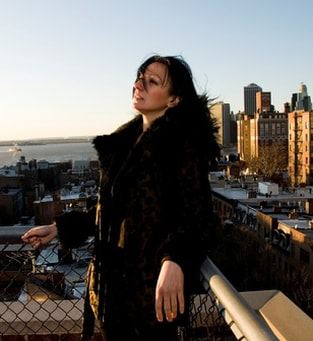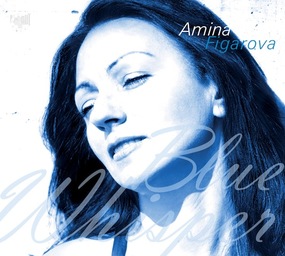Interview with
Amina Figarova
Jazz Pianist and Composer
|
Amina Figarova is an internationally-known jazz pianist and composer who was born in Baku, Azerbaijan. Amina took classical lessons as a young girl, but found that she loved improvisation. She grew up listening to jazz at home, and in the late ‘80s decided to pursue this complex music genre at Rotterdam Conservatory in the Netherlands. She then completed her formal education at Berklee College of Music in Boston.
For decades, she has played with musicians from across Europe and the U.S. The Amina Figarova Sextet (which includes flutist, Bart Platteau, Amina’s partner and husband of 25 years) has triumphed at the main stage of the Newport Jazz Festival. The sextet has been invited repeatedly to the New Orleans Jazz and Heritage Festival and has won critical and popular acclaim in Chicago, Detroit, Paris, Amsterdam and New York. Thomas Conrad of Jazz Times says, “Figarova is among the most important composers to come into jazz in the new millennium.” |
Blue Whisper is Amina’s 13th album since her 1994 debut titled Attraction. Figarova's deeply personal responses to social turmoil and universal life transitions were inspirations for the compositions in Blue Whisper. Moods range from the hauntingly beautiful title track, "Blue Whisper," to "Hewa" (which features lyrics in Swahili by Sarah Elizabeth Charles). Throughout the work, Amina's classically-founded touch and luminous harmonies are accompanied by star soloists.
Amina currently resides in Manhattan with her husband, where they enjoy the jazz-rich culture that surrounds them.
Amina currently resides in Manhattan with her husband, where they enjoy the jazz-rich culture that surrounds them.
In July 2016, Myrna Beth Haskell, managing editor, enjoyed a performance by the Amina Figarova Sextet at the Deer Head Inn, a jazz club in the historic Delaware Water Gap in Pennsylvania. She recently interviewed Amina to talk about her life as a composer and band leader as well as her journey into the world of jazz.
At what age did you first start to play the piano? Did anyone influence you?
We had a piano in the house, and I discovered it when I started to walk. No one pushed me. I was two when I started playing. We had music on at home all of the time. My mother noticed that when the music was on, I would be really quiet…listening and then humming along to it.
What is it that you love about jazz?
When I was growing up, a lot of jazz was always playing at home. Since it’s improvisational, it has a very natural feel. When I went to a special school, I tried to improvise everything all the time. I was learning to play, and I would interpret the music. This came natural to me. My mom always let me do what I wanted when she would hear me playing. So, I was developing a jazz background unconsciously at a very young age.
When you are composing, what are some of the things that inspire you?
As a composer, I relate my music to experiences in my life. I can tell you about one of the turning points in my career. I was in New York when 911 happened. I had played at the Blue Note Jazz Club on the 9th. I was staying with a friend in the area, and I would pass all these firefighters every day – the same faces. Soon after, I went back to the Netherlands. I was watching a documentary about a British family. They were being interviewed. The father had died in the towers. The family was looking for closure, so they had visited the site. There was smoke still coming up in the background. The mom and daughter had such different perspectives. The daughter was still hoping her father would come out of the rubble alive. It was heartbreaking. Everything started coming back to me…the firefighters in the streets…all their faces. My father also passed away around that time.
I wasn’t thinking of making a recording. The music was just pouring out of me. This is when my music went in a different direction. It came from mourning. It was heavy. There was rage and ugliness. The rage shuts you down and you’re numb. It was almost like I was someone else. That experience gave me a chance to think deeper and wider. September Suite came out of this. When I perform this music, it is very emotional for me. After one of my performances, this man came up to talk with me, and he said the music helped him. He was grieving for a loved one still.
What do you appreciate about the jazz culture in New York City where you now live?
We came in 1992. I love the energy and the feel of the city. It’s hard to explain, but there is something about the city. I knew I wanted to be here. The jazz culture…well there is a crazy dedication with the musicians who live here. It’s inspiring.
Editor’s Note: Amina plays each year at Dizzy’s in Manhattan (Columbus Circle) as well as other jazz clubs in and around NY. After an appearance in Philadelphia on November 9th, she will be touring Europe: Poland, Belgium, Germany and Switzerland. Please visit her website for all future performance locations.
At what age did you first start to play the piano? Did anyone influence you?
We had a piano in the house, and I discovered it when I started to walk. No one pushed me. I was two when I started playing. We had music on at home all of the time. My mother noticed that when the music was on, I would be really quiet…listening and then humming along to it.
What is it that you love about jazz?
When I was growing up, a lot of jazz was always playing at home. Since it’s improvisational, it has a very natural feel. When I went to a special school, I tried to improvise everything all the time. I was learning to play, and I would interpret the music. This came natural to me. My mom always let me do what I wanted when she would hear me playing. So, I was developing a jazz background unconsciously at a very young age.
When you are composing, what are some of the things that inspire you?
As a composer, I relate my music to experiences in my life. I can tell you about one of the turning points in my career. I was in New York when 911 happened. I had played at the Blue Note Jazz Club on the 9th. I was staying with a friend in the area, and I would pass all these firefighters every day – the same faces. Soon after, I went back to the Netherlands. I was watching a documentary about a British family. They were being interviewed. The father had died in the towers. The family was looking for closure, so they had visited the site. There was smoke still coming up in the background. The mom and daughter had such different perspectives. The daughter was still hoping her father would come out of the rubble alive. It was heartbreaking. Everything started coming back to me…the firefighters in the streets…all their faces. My father also passed away around that time.
I wasn’t thinking of making a recording. The music was just pouring out of me. This is when my music went in a different direction. It came from mourning. It was heavy. There was rage and ugliness. The rage shuts you down and you’re numb. It was almost like I was someone else. That experience gave me a chance to think deeper and wider. September Suite came out of this. When I perform this music, it is very emotional for me. After one of my performances, this man came up to talk with me, and he said the music helped him. He was grieving for a loved one still.
What do you appreciate about the jazz culture in New York City where you now live?
We came in 1992. I love the energy and the feel of the city. It’s hard to explain, but there is something about the city. I knew I wanted to be here. The jazz culture…well there is a crazy dedication with the musicians who live here. It’s inspiring.
Editor’s Note: Amina plays each year at Dizzy’s in Manhattan (Columbus Circle) as well as other jazz clubs in and around NY. After an appearance in Philadelphia on November 9th, she will be touring Europe: Poland, Belgium, Germany and Switzerland. Please visit her website for all future performance locations.




